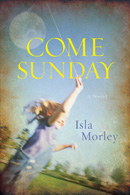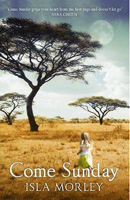
Prospective readers may not choose to read a novel reviewed as harrowing, sometimes depressing, difficult to read (without a box of tissues to wipe away tears), with a protagonist who is at times drawn unsympathetically. However, for readers who are willing to cast this aside, Come Sunday is a rewarding and beautifully written book.
The main character is Abbe, a 38 year old mother, wife and journalist of South African descent. Having fled her homeland, she lives in Hawaii with her preacher husband Greg and her precocious two year old daughter Cleo. Abbe is stressed out: she and Greg have drifted apart, there is no money, the roof leaks, the neighbours are always watching, and Abbe does not feel she is a good mother.
In an effort to reignite the passion in their relationship (which Abbe feels has been 'lost over the great swell of laundry') Abbe and Greg go out on a date, leaving Cleo with family friend Teresa. On their return, the couple is rushed to hospital to discover that Cleo has sustained major brain trauma from a car crash. Cleo puts up a fight, but unfortunately dies from her injuries.
Abbe and Gregg struggle to accept the death of Cleo. However, as days turn into months, Abbe cannot and does not want to drag herself out of despair. She shows scant concern for Greg, and realises she does not love him despite his attempts to comfort her. When he arranges a memorial service to scatter Cleo's ashes on the beach, Abbe instead scatters the ashes alone in the Hawaiian rainforest. This act of selfishness results in Greg ending the marriage.
As Abbe spirals further downwards, her behaviour becomes self destructive, cruel and bitter. Abbe wallows in her grief, her despair is harrowing to read: "I am alive and she is dead. I have lived four thousand four hundred and twenty hours since she died, four thousand four hundred and twenty hours when I wanted to stay asleep, be unconscious, die."
A year after Cleo's death, Abbe's friends and brother, Rhiaan, encourage her to move on. Rhiaan tells her: "you've got to lean with all your might against the boulder of the present and wedge it loose even if means you have to watch it careen into your neatly built idea of the future". Faced with the repossession of her little house in Hawaii, Abbe and Rhiaan agree to sell the farm inherited from their grandmother in South Africa. Armed with a high offer from developers, Abbe finds courage to travel to South Africa to sign away the deeds.
Isla Morley creates a South Africa which for Abbe is shrouded in mystery, intrigue, and bad memories of her childhood. Yet South Africa awakens the life in Abbe; before the plane lands she can feel "the beat, the pulse, the drumming of Africa... the pennywhistle calling to join the dance". Determined to sell the farm, Abbe embarks upon a trip that reminds her that she is alive and teaches her to accept the past; a Xhosa lady reminds her, 'Your past is always with you - be friends with it and it will help you find a good future'.
Ultimately, despite the heavy themes of death and grieving, Come Sunday is redeemed by the beautiful,
gritty, intense, realistic writing, the fallible characters, and recognition that life is not a bed of roses. Grief
is not reasonable; it is blind in its fury and requires patience, understanding and hope. Isla Morley is to be admired
for creating Abbe, a character who is not always graceful, who is stressed, angry, and unpredictable, but also strong
enough to carry on in the face of devastating loss. Isla Morley shows the world as it is, not through rose tinted
glasses, not black or white, not all good or difficult times. The book ends in hope, as Abbe becomes able to reflect
on memories and not just loss.


Farrar, Straus and Giroux, hardcover, 9780374126872
Hodder & Stoughton, paperback, 9780340976517
